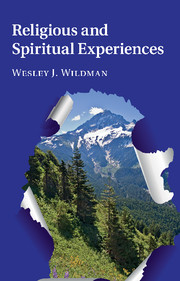Book contents
- Frontmatter
- Contents
- List of figures
- Preface
- Acknowledgements
- 1 Exploring a strange yet familiar landscape: a strategy for interpreting religious and spiritual experiences
- 2 Spirituality and the brain: a revolutionary scientific approach to religious and spiritual experiences
- 3 A smorgasbord of dangers and delights: the phenomenology of religious and spiritual experiences
- 4 Gateway to ultimacy: the importance of intense experiences
- 5 Can you trust your instincts? The cognitive reliability of religious and spiritual experiences
- 6 The brain-group nexus: the social power of religious and spiritual experiences
- 7 Make it start, make it stop! Religious and spiritual experiences in the future
- 8 Brains in bodies, persons in groups, and religion in nature: an integrative interpretation of religious and spiritual experiences
- Glossary of key terms
- References
- Index
1 - Exploring a strange yet familiar landscape: a strategy for interpreting religious and spiritual experiences
Published online by Cambridge University Press: 04 February 2011
- Frontmatter
- Contents
- List of figures
- Preface
- Acknowledgements
- 1 Exploring a strange yet familiar landscape: a strategy for interpreting religious and spiritual experiences
- 2 Spirituality and the brain: a revolutionary scientific approach to religious and spiritual experiences
- 3 A smorgasbord of dangers and delights: the phenomenology of religious and spiritual experiences
- 4 Gateway to ultimacy: the importance of intense experiences
- 5 Can you trust your instincts? The cognitive reliability of religious and spiritual experiences
- 6 The brain-group nexus: the social power of religious and spiritual experiences
- 7 Make it start, make it stop! Religious and spiritual experiences in the future
- 8 Brains in bodies, persons in groups, and religion in nature: an integrative interpretation of religious and spiritual experiences
- Glossary of key terms
- References
- Index
Summary
INTRODUCTION
What is the point of studying religious and spiritual experiences (RSEs)? What can we hope to achieve intellectually and practically? These questions are deceptively simple, but compelling answers prove difficult to construct, suggesting that fascinating and important issues are at stake.
Some years ago in Montreal I had a private conversation with Dr. Andrew Newberg after he had delivered one of his fabulous stump speeches on the neurophysiology of RSEs. Well known for studying expert meditators using functional imaging of the brain, Newberg had colorful resources to draw on for his presentation, and it was entertaining as a result. The lecture was also pregnant with hints about the wider philosophical significance of the research. So when we met I asked him about the point of his study of meditation experiences. I noted that many in his audience that day were enthusiastic about his research and spoke as if he had produced evidence for the authenticity, cognitive reliability, and spiritual value of such experiences. I asked Newberg if he thought his data justified such a conclusion. He replied that he thought that the data justified neither that conclusion nor its opposite. Then he told me that when he makes the very same presentation to groups who tend to view RSEs in a negative light, they are equally enthusiastic and take his research to confirm the delusory and unhealthy character of such experiences.
- Type
- Chapter
- Information
- Religious and Spiritual Experiences , pp. 1 - 30Publisher: Cambridge University PressPrint publication year: 2011



